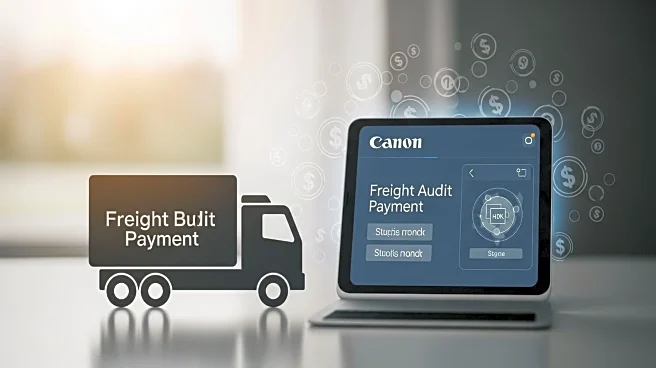What's Happening?
U.S. Bank is advancing its freight bill audit and payment (FBAP) solutions in response to evolving economic conditions, including fluctuating tariffs, interest rates, and inflation. The bank is leveraging technology and industry expertise to streamline freight billing, auditing, and payment processes for shippers. Scott Burglechner, Senior Vice President and Head of Freight Payment Product Management, highlights the bank's focus on delivering solutions that enhance operational efficiency and working capital. U.S. Bank's partnership with a major apparel retailer has resulted in significant cost savings, with cumulative savings exceeding $100 million over six years. The bank is also exploring AI applications to improve invoice validation and continues to invest in data security through its Tier IV data center.
Why It's Important?
The advancements in U.S. Bank's FBAP solutions are crucial for shippers seeking to navigate complex supply chains and economic uncertainties. By providing real-time business intelligence and automation, U.S. Bank empowers clients to make informed decisions, potentially reducing transportation expenses by up to 10% in the first year. The bank's focus on both shippers and carriers ensures accurate and prompt payments, fostering positive business relationships. As tariffs and supply chain disruptions persist, U.S. Bank's solutions offer a strategic advantage in maintaining operational resilience and cost control.
What's Next?
U.S. Bank plans to continue investing in technology to enhance its FBAP solutions, including the use of AI for analyzing proof-of-delivery images. The bank's ongoing commitment to data security and industry collaboration positions it as a leader in the freight payment sector. As economic conditions evolve, U.S. Bank's solutions will likely play a pivotal role in helping shippers and carriers adapt to new challenges and opportunities.
Beyond the Headlines
The integration of AI and automation in U.S. Bank's FBAP solutions reflects broader trends in the financial and logistics industries, where technology is increasingly used to optimize operations and reduce costs. The bank's emphasis on data security and compliance highlights the growing importance of safeguarding client information in an era of digital transformation.










